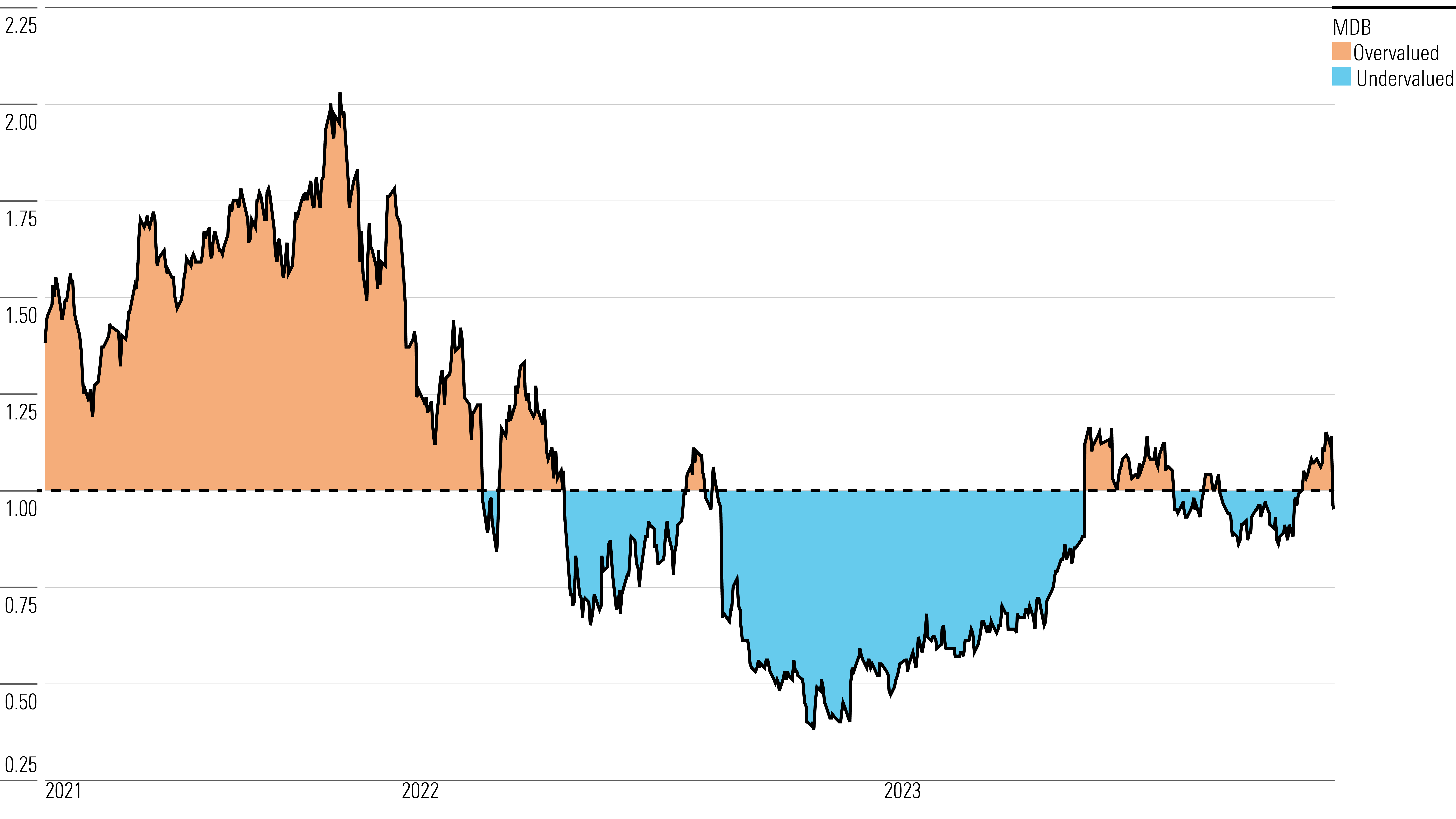After Earnings, Is MongoDB Stock a Buy, a Sell, or Fairly Valued?
With higher-than-expected margin expansion, here’s what we think of MongoDB stock.

MongoDB MDB released its third-quarter earnings report on Dec. 5. Here’s Morningstar’s take on MongoDB’s earnings and stock.
Key Morningstar Metrics for MongoDB
- Fair Value Estimate: $403.00
- Morningstar Rating: 3 stars
- Morningstar Economic Moat Rating: None
- Morningstar Uncertainty Rating: High
What We Thought of MongoDB’s Q3 Earnings
- MongoDB’s third-quarter results were stellar, coming in well above both our estimates and FactSet consensus as enterprise revenue exceeded expectations, partially thanks to higher volumes in multiyear deals. In our view, momentum indicates how strong demand is for MongoDB’s capabilities, from its core document-based database (which we believe excels because it is easy to use) to newer features like artificial intelligence-generated code.
- Such strength led the firm to raise its outlook for the year. Despite the excellent quarter, the market reacted poorly, with shares dropping by about 6%. The mismatch was a result of words of caution from management, which highlighted near-term headwinds the firm is facing in the name of long-term rewards. We have a strong conviction that such near-term investments and mix shifts will enable the firm to reap more value from the seedlings of strong switching costs we see throughout the business. As a result, we are increasing our fair value estimate to $403 per share from $379. Shares traded near $409 per share after hours, putting the stock in fairly valued 3-star territory.
- Third-quarter revenue increased 30% year over year to $433 million, thanks to the popularity of Enterprise Advanced multiyear deals. Non-GAAP operating margin expansion was significant in the quarter, with margins at 18% compared with 6% in the prior-year period. However, management clearly emphasized that such levels of margin expansion were higher than they wanted, given the opportunities ahead, which merits robust investment in the near term. We expect MongoDB’s margin expansion will slow down in fiscal 2025 as a result of conscious spending by the firm, as well as the increasing mix shift of Atlas’ revenue, which should be dilutive to margins. Nonetheless, we think these are wise moves for the long term.
MongoDB Stock Price
Fair Value Estimate for MongoDB
With its 3-star rating, we believe MongoDB’s stock is fairly valued compared with our long-term fair value estimate.
Our fair value estimate for MongoDB is $403 per share. Our valuation implies forward fiscal-year enterprise value/sales of 16 times and a free cash flow yield of -1%. Our assumptions are based on our expectation that MongoDB will achieve a compound annual growth rate of 28% over the next five years. The company is in its infancy, but it has a massive market opportunity and a large runway for growth, in our view. We expect this substantial growth to be driven by continued shifts of workloads to a cloud environment, prompting the database market to grow robustly (especially NoSQL databases like document-based databases) as companies realize how much easier it is to scale data storage in the cloud. This in turn implies substantial usage growth per customer.
Additionally, we think MongoDB’s database-as-a-service offering, Atlas, and its data lake will bring significant new revenue streams to the company. Atlas revenue eclipsed on-premises sales in early fiscal 2022.
We forecast that MongoDB’s gross margins will stay relatively the same, as the company’s increasing mix of Atlas revenue is somewhat margin dilutive in the near term. We expect GAAP operating margins to increase from -27% in fiscal 2023 to 30% in fiscal 2033 because of operating leverage as revenue growth exceeds operating expenses.
Read more about MongoDB’s fair value estimate.
MongoDB Historical Price/Fair Value Ratio

Economic Moat Rating
We assign MongoDB no economic moat. We think the company benefits from significant switching costs with the customers it has captured thus far. However, it is still in its customer acquisition phase, and it’s unclear whether those costs will lead to excess returns on invested capital over the next 10 years, as MongoDB lacks profitability and continues to aggressively spend on sales and marketing.
Data is increasingly mission-critical to enterprises, which makes selecting a database vendor important for a company. With increasingly complex enterprise IT infrastructures, businesses need to think twice before switching databases, which are interconnected to many systems across a business, thus requiring much time and money for reintegration. MongoDB is considered a general-purpose database, meaning it can be used in a variety of use cases. Developers can interact with the database in any major programming language, and MongoDB is compatible with any deployment of its database, from on-premises to cloud-only to a hybrid deployment. In our view, all these flexible characteristics give customers little impetus to change database software.
This is not a winner-take-all market. Enterprises use a variety of databases to meet different needs. According to management, MongoDB typically represents only single digits of an enterprise’s total spend on databases. Therefore, we want to stress that we think strong switching costs exist at the molecular level. Ripping out MongoDB can be painful for a single use case within an enterprise, even if that enterprise can claim it uses multiple vendors.
Read more about MongoDB’s moat rating.
Risk and Uncertainty
We assign MongoDB a High Morningstar Uncertainty Rating due to its place in a technological landscape, which has the potential to shift rapidly.
MongoDB faces uncertainty based on future competition. There’s the risk of Amazon AMZN encroaching on its abilities. Currently, Amazon’s DocumentDB service claims it has MongoDB compatibility so it can help companies deploy MongoDB at scale in the cloud, similarly to MongoDB Atlas. DocumentDB currently has significant limitations compared with Atlas—it cannot support rich data types, it’s only interoperable with AWS, and it has only 63% compatibility with MongoDB.
While many open-source software companies have suffered from Amazon reselling their software on its platform for a profit (for example, Elastic was repackaged into Amazon Elasticsearch), MongoDB is protected against this risk, as the firm’s software license bans Amazon from reselling its software on AWS.
Read more about MongoDB’s risk and uncertainty.
MDB Bulls Say
- MongoDB’s document-based database is best equipped to remove fears of vendor lock-in and is poised for a strong future.
- MongoDB’s new data lake could gain significant traction, making the firm even stickier, as we believe data lakes have greater switching costs than databases. This could in turn further boost returns on invested capital.
- MongoDB could eventually launch a data warehouse offering, which would further increase customer switching costs.
MDB Bears Say
- Document-based databases could decrease in popularity as a new NoSQL variation arises and better meet developer needs.
- Cloud service providers like AWS could catch up to MongoDB in terms of its rich features.
- MongoDB’s profitability could see only gradual improvements, as the need or relevance in a fast-changing tech landscape could diminish major operating leverage.
This article was compiled by Brendan Donahue.
The author or authors do not own shares in any securities mentioned in this article. Find out about Morningstar’s editorial policies.

/s3.amazonaws.com/arc-authors/morningstar/f497c984-8e67-4c32-8c6c-210934e57017.jpg)
/cloudfront-us-east-1.images.arcpublishing.com/morningstar/TP6GAISC4JE65KVOI3YEE34HGU.jpg)
/d10o6nnig0wrdw.cloudfront.net/04-29-2024/t_d0e8253d77de4af9ae68caf7e502e1bf_name_file_960x540_1600_v4_.jpg)
/cloudfront-us-east-1.images.arcpublishing.com/morningstar/YTLLJ3VT4NFZTCTDNZPCUR27D4.jpg)
:quality(80)/s3.amazonaws.com/arc-authors/morningstar/f497c984-8e67-4c32-8c6c-210934e57017.jpg)